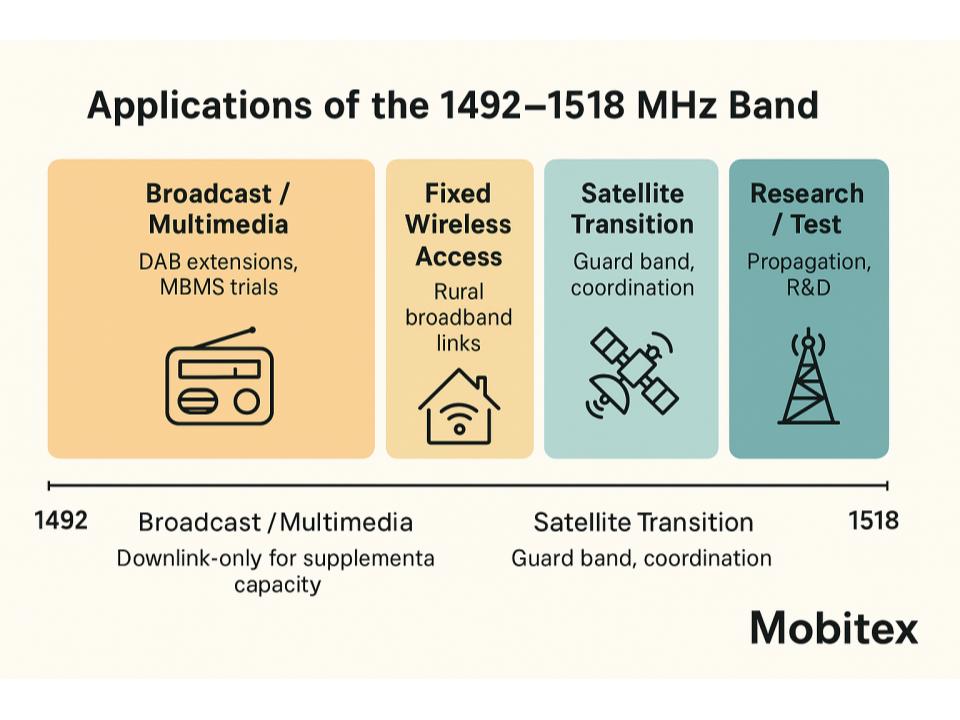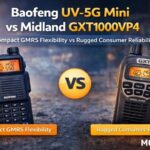Frequency
1498 MHz
Range
1493–1518 MHz
Band Group
L‑Band Mobile SDL & Fixed Links (1452–1492 MHz)
🌐 Summary
The 1498 MHz allocation is part of the L‑Band Mobile SDL & Fixed Links (1452–1492 MHz) spectrum. This range is used worldwide for critical applications that keep our communications and infrastructure running smoothly. On this page we highlight how each band is applied in real systems, from regulatory assignments to everyday devices. Our goal is to make spectrum data clear and practical for engineers, regulators, and enthusiasts alike.
Key uses of this band include: 1498 MHz sits in the upper L-band near SDL and FWA uses. Requires coexistence with DAB/SDL below 1492 MHz and MSS downlinks above 1518 MHz..
Upper L-Band SDL; protect MSS >1518 MHz; admin-dependent use

🔍 Explore the full RF Spectrum database
📡 Band & Geometry key
| Field | Value |
|---|---|
| Wavelength (m) | 0.200267 |
| Waveforms | |
| Antenna Form Factor (Typical) | Panel/sector for sites; compact λ/4 or PIFA for devices |
| Band Family | L-Band (1–2 GHz) |
| Band | 1452–1492 MHz Mobile Supplemental Downlink (SDL) / Fixed & Mobile Links (region‑dependent) |
| Primary Common Name | L‑Band Supplemental Downlink (SDL) |
| FSPL @ 1 km [dB] | 95.95 |
| FSPL @ 10 km [dB] | 115.95 |
| Fresnel Radius @ 1 km (m) | 7.08 |
| Band Group | L‑Band Mobile SDL & Fixed Links (1452–1492 MHz) |
| Tax Band Family | UHF/L-band Transition |
| Tax Band Class | 1493 MHz – 1518 MHz UHF/L-band Transition Broadcast / Mobile (SDL) |
🧩 Applications & Usage
| Field | Value |
|---|---|
| Primary Application | LTE/NR Supplemental Downlink (SDL) and Fixed Wireless Access |
| Lower Neighbor Use | DAB/DAB+ multiplexes; SDL use in some markets |
| Upper Neighbor Use | Mobile-satellite downlink; strict OOBE control |
| Typical Services Devices | LTE/NR small cells; FWA CPE; broadcast receivers (legacy) |
| Market Common Devices | LTE/NR small cells; FWA CPE; DAB receivers (legacy). |
| Refarming Use | Potential migration from legacy L-Band broadcast to SDL/FWA |
| Device Ecosystem Size | |
| Device Hotspots (MHz) | |
| Device Category | |
| Typical Use Cases | |
| Modulation (Device) | LTE/NR OFDM; legacy DAB COFDM |
| Channel Width (Device) [kHz] | 1536; 5000/10000/15000/20000 |
| Device Region Profiles | EU/EMEA SDL; limited APAC/AMER trials |
| Per-Region EIRP Or Duty (Device) | Admin‑dependent; UE ≤23 dBm; downlink reception unconstrained |
| Allocation Relevance (Device) | High in Region 1; Medium elsewhere |
| Adjacent-Band Collision Risks (Device) | MSS downlink susceptibility >1518 MHz; high‑selectivity filters advised |
| Example Devices Or Skus | Small‑cell radios (B32/B75/B76); DAB receivers (legacy) |
| Common Protocols | LTE-A/NR (SDL); OFDM/COFDM (DAB legacy) |
🗒️ Notes
| Field | Value |
|---|---|
| Receiver Selectivity Notes | Use cavity/SAW filters; ≥50 dB rejection at ±5 MHz; steeper skirts near 1518 MHz to protect MSS |
| Interference Notes | Coordinate with neighbors; sharp filters; manage OOBE and PIM |
| Compatibility Risk Notes | |
| Notes | Upper L-Band SDL; protect MSS >1518 MHz; admin-dependent use |
| Propagation Notes | Mid-band NLOS; moderate wall loss; compact λ/4 (~5 cm) |
⚙️ Technical Rules
| Field | Value |
|---|---|
| Lower Band Frequency Limit | 1493 |
| Upper Band Frequency Limit | 1518 |
| EIRP Indoor Limits | |
| EIRP Outdoor Limits | |
| PSD Limit | |
| Emission Mask Class | 3GPP LTE/NR BS mask (TS 36.104 / TS 38.104) |
| Guardband Minimum [kHz] | 1000 |
| Typical Bandwidths | 5–20 MHz (SDL); 1.536 MHz (DAB multiplex) |
| Autocalculated Bandlimits | 1452–1518 MHz |
| Typical Bandwidths (Estimated) | 5–20 MHz (SDL); 1.536 MHz (DAB multiplex) |
| Max EIRP [dBm] | Admin‑dependent; UE ≤23 dBm; downlink reception unconstrained |
| Power Source Or Duty Profile (Typical) | Broadcast continuous (legacy); SDL bursty traffic |
| Channelization Plan | Contiguous SDL 5/10/15/20 MHz; DAB block 1.536 MHz (legacy) |
| Channelization | LTE/NR SDL 5/10/15/20 MHz; legacy DAB blocks ≈1.536 MHz |
| Guard Band Requirement | ≈1 MHz typical; ≈2 MHz near 1518 MHz (MSS edge) |
| OOB Emission Limit [dBm/MHz] | |
| Spurious Emission Limit (dBm) | ≤ −30 dBm/100 kHz (typical 3GPP OOBE) |
| RX Blocking Min [dBm] | UE: ≥ −15 dBm; BS: ≥ −30 dBm (reference) |
| Duplexing | |
| Duplexing Information | Downlink-only SDL (no paired uplink); DAB broadcast (unidirectional) |
| Uplink Pairing | None (SDL DL-only) |
| Downlink Pairing | Downlink-only (SDL); Broadcast (legacy) |
| Paired Band Info | Not paired (SDL). Anchors via LTE/NR Bands 1/3/20 (regional). |
| Max EIRP [dBm] | BS small cell ≤46 dBm EIRP; macro per‑license; UE ≤23 dBm |
| Channelization Block Size | 5 / 10 / 15 / 20 MHz (SDL); 1.536 MHz (DAB) |
| 3GPP Band Number | |
| Example 3GPP Bands | LTE B75/B76, NR n75/n76 (regional) |
| LTE Uplink Bands | B75 UL aggregation (where supported) |
| LTE Downlink Bands | B76/B32 SDL aggregation (admin-dependent) |
| NR Uplink Bands | n75 (where supported) |
| NR Downlink Bands | n76 (DL); n32 (SDL) where licensed |
| Guard Bands | ≈ 1 MHz typical; 2 MHz near MSS boundary (>1515 MHz) |
| Protocol Or Standard |
🌎 Country Overrides
| Field | Value |
|---|---|
| Tax Service Category | Broadcasting / Mobile / Fixed |
| Tax License Type | Licensed broadcast / fixed |
| Tax Regions | Global (allocations vary by administration) |
| ITU Region 1 (Europe, Africa, Middle East (west of Persian Gulf), Western Russia & Mongolia) | Region 1 (Europe/Africa): L‑Band SDL focus (3GPP B75/B76, n75/n76). Coordinate with DAB/DAB+ below 1492 MHz and protect MSS downlinks above 1518 MHz. Tight OOBE and guard bands required near 1518 MHz. |
| ITU Region 2 (North America, South America, Central America, Caribbean, Greenland, Eastern Pacific Islands (Americas region)) | Region 2 (Americas): Limited terrestrial allocation. Used mainly for FWA/experimental and telemetry trials where authorized. No nationwide DAB; protect adjacent MSS downlinks above 1518 MHz. |
| ITU Region 3 (Asia, Australia, Pacific Islands, Oceania, Indian Subcontinent, East Asia & Southeast Asia) | Region 3 (Asia‑Pacific): Mixed adoption; administrations studying SDL/FWA use. Local trials possible; coordination with satellite services above 1518 MHz required. |
| License Type | |
| Primary Application | LTE/NR Supplemental Downlink (SDL) and Fixed Wireless Access |
| Primary Services | Mobile (SDL), Fixed service; coordinated near MSS downlinks |
| Spurious Emission [dBm] | ≤ −30 dBm/100 kHz (typical 3GPP OOBE) |
| Lower Neighbor Use | DAB/DAB+ multiplexes; SDL use in some markets |
| Upper Neighbor Use | Mobile-satellite downlink; strict OOBE control |
| Licensing Model | |
| Typical Services Devices | LTE/NR small cells; FWA CPE; broadcast receivers (legacy) |
| US FCC Alloc | – |
| CA IC Alloc | – |
| UK Ofcom Alloc | – |
| US Ref | |
| Typical Bandwidths | 5–20 MHz (SDL); 1.536 MHz (DAB multiplex) |
| Market Licensing Model | Licensed SDL/fixed service (Region 1); limited/trial FWA elsewhere. |
| Market Common Devices | LTE/NR small cells; FWA CPE; DAB receivers (legacy). |
| Fresnel Radius (1st, 1 km) [m] | 7.08 |
| Typical Bandwidths (Estimated) | 5–20 MHz (SDL); 1.536 MHz (DAB multiplex) |
| Auction Status | Licensed SDL in EU/EMEA; limited/experimental elsewhere |
| Refarming Use | Potential migration from legacy L-Band broadcast to SDL/FWA |
| Typical Site Spacing km | 2–5 / 10–20 |
| Device Ecosystem Size | |
| Traffic Load Share | |
| Device Hotspots (MHz) | |
| Device Category | |
| Typical Use Cases | |
| Typical Center Frequencies [MHz] | |
| Rule Part (Fcc Or Region) | |
| Modulation (Device) | LTE/NR OFDM; legacy DAB COFDM |
| Channel Width (Device) [kHz] | 1536; 5000/10000/15000/20000 |
| Device Region Profiles | EU/EMEA SDL; limited APAC/AMER trials |
| Per-Region EIRP Or Duty (Device) | Admin‑dependent; UE ≤23 dBm; downlink reception unconstrained |
| Allocation Relevance (Device) | High in Region 1; Medium elsewhere |
| Adjacent-Band Collision Risks (Device) | MSS downlink susceptibility >1518 MHz; high‑selectivity filters advised |
| Example Devices Or Skus | Small‑cell radios (B32/B75/B76); DAB receivers (legacy) |
| Antenna Form Factor (Typical) | Panel/sector for sites; compact λ/4 or PIFA for devices |
| Power Source Or Duty Profile (Typical) | Broadcast continuous (legacy); SDL bursty traffic |
🛡️ Regulatory & Neighbors
| Field | Value |
|---|---|
| Lower Band Frequency Limit | 1493 |
| Upper Band Frequency Limit | 1518 |
| Rx Blocking Min dBm | UE: ≥ −15 dBm; BS: ≥ −30 dBm (reference) |
| Lower Neighbor Use | DAB/DAB+ multiplexes; SDL use in some markets |
| Upper Neighbor Use | Mobile-satellite downlink; strict OOBE control |
| Lower Neighbor Band | |
| Lower Neighbor Range | 1452–1492 MHz (DAB/DAB+ / SDL) |
| Upper Neighbor Label | |
| Upper Neighbor Range | 1518–1559 MHz (MSS downlink) |
| Adjacent-Band Collision Risks (Device) | MSS downlink susceptibility >1518 MHz; high‑selectivity filters advised |
| Real-World Range (Indoor/Outdoor) | Indoor 0.2–1 km; Outdoor 1–5 km (terrain/site‑dependent) |
| US FCC Alloc | |
| CA IC Alloc | |
| UK Ofcom Alloc | |
| Regulatory References | US: ; CA: ; UK: |
| Global Harmonization | Partial (Region 1 SDL); Limited elsewhere |
| Crossborder Coordination | Required near borders and 1518+ MHz (MSS); harmonize masks |
| Sharing Mechanism | |
| Auction Status | Licensed SDL in EU/EMEA; limited/experimental elsewhere |
| Guard Or Pair | Guard bands vary by admin; follow 3GPP/ETSI masks |
📈 Market & Measurements
| Field | Value |
|---|---|
| Noise Floor | Thermal ≈ −174 dBm/Hz; environment dependent |
| Interference Cases | Adjacent SDL/telemetry and MSS; intermod near L/S‑band |
| Lower Neighbor Range | 1452–1492 MHz (DAB/DAB+ / SDL) |
| Upper Neighbor Range | 1518–1559 MHz (MSS downlink) |
| Interference Notes | Coordinate with neighbors; sharp filters; manage OOBE and PIM |
| Market Licensing Model | Licensed SDL/fixed service (Region 1); limited/trial FWA elsewhere. |
| Market Commercial Value | Medium–High (EU SDL); Medium (localized FWA). |
| Market Common Devices | LTE/NR small cells; FWA CPE; DAB receivers (legacy). |
| Market Deployment Density | Urban: Medium–High (capacity boost); Rural: Low–Medium (FWA). |
| Noise Floor (Estimated) | Thermal ≈ −174 dBm/Hz; environment dependent |
| Market Commercial Value (Estimated) | Medium–High (EU SDL); Medium (localized FWA). |
| Ecosystem Maturity | Moderate (growing SDL/FWA; limited UE support) |
| Indoor Penetration | Moderate (better than 2–3 GHz; worse than sub‑1 GHz) |
| Known Interference | |
| Device Ecosystem Size | |
| Real-World Range (Indoor/Outdoor) | Indoor 0.2–1 km; Outdoor 1–5 km (terrain/site‑dependent) |
| Antenna Form Factor (Typical) | Panel/sector for sites; compact λ/4 or PIFA for devices |
| Ecosystem Maturity | Moderate (growing SDL/FWA; limited UE support) |
| Device Ecosystem Size | |
| Chipset Availability | |
| Operator Deployments | |
| Technology Generations Deployed | |
| Roaming Support | |
| Traffic Load Share | |
| Indoor Penetration | Moderate (better than 2–3 GHz; worse than sub‑1 GHz) |
| Known Interference | |
| Occupancy | Region 1: Medium–High (SDL/broadcast); Regions 2/3: Low–Medium |
| Occupancy Bucket Pct | 35% |
| Latency Profile | Low–Medium (CA downlink emphasis) |
| Common Channels Or Profiles | |
| Security Features | |
| Lbt Or Fhss Requirement | |
| Popularity (Installed Base) | Growing (SDL sites); legacy DAB installed base where present) |
| Coexistence Tips | Cavity/SAW filtering; align masks; manage OOBE near 1518 MHz |
| Latency Class | General broadband DL; CA‑optimized |
| Device Hotspots (Scoped && Tagged) | EU capital cores; transport corridors; trial campuses |

